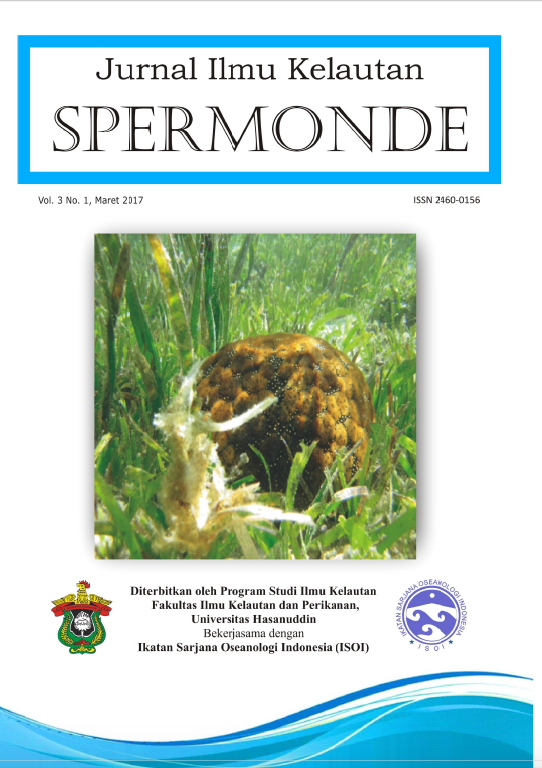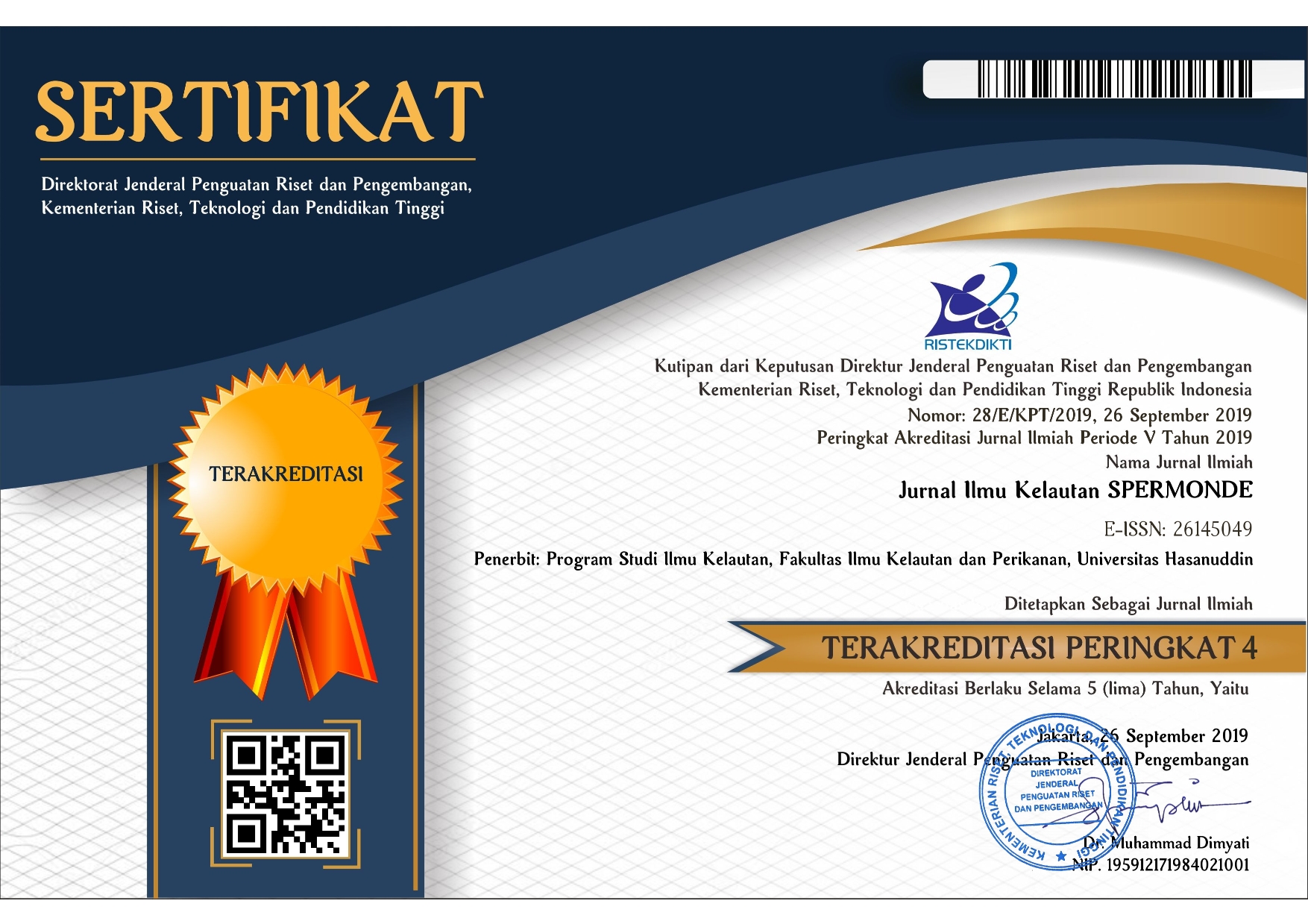PENUTUPAN KARANG DI PULAU BARANGLOMPO DAN PULAU BONE BATANG BERDASARKAN METODE REEF CHECK
DOI:
https://doi.org/10.20956/jiks.v3i1.2123Abstract
The Research on “Coral Coverage in Baranglompo Island and Bone Batang Island Based on Reef Check Method” was conductedin April 2016. The aims of this study was to determine and to compare the condition of reefs in Baranglompo and Bone BatangIslands based on the percentage of life coral cover by using Reef Check methods. This study also aims to determine whichfactors that most affect the percentage of coral cover on each island i.e: abiotic factors (temperature, salinity and substrate inthe form of rock, rubble, sand, silt/clay); biotic factors (soft coral, recent killed coral, algae, sponges, fish and invertebratesassociate) and anthropogenic factors (garbage, ilegal fishing/bombs, stun, anchors, nets) were also investigated. Percentage oflife coral cover obtained by Line Intercept Transect (LIT) along 100 meters at a depth of 3 meters and 10 meters. The resultsshowed that the condition of coral reefs in Baranglompo was classified as moderate with an average percentage coral coverageof 42% at a depth of 3 meters and 27% at a depth of 10 meters. While the condition of coral reefs in Pulau Bone Batang wasrelatively good with average coral cover of 51% at 3 meters depth and moderate with average coral cover of 39% at 10 metersdepth. Condition of coral reefs in Bone Batang is better than Baranglompo islands. Anthropogenic impacts in the form of wasteis the most influential factor on coral cover on the island Baranglompo. Whereas fishing activities by using dinamite are thefactors that most influence on coral cover on the island of Bone Batang.Keywords: Coral coverage, Baranglompo island, Bone Batang island, Reef CheckDownloads
References
Burke, L., R., Kathleen, S. Mark and P. Allison. 2012.
Reefs at Risk Revisited in the Coral Triangle.
(Terjemahan Yayasan Terangi). World Resource
Institute. Hal: 26.
COREMAP II dan CV. Wahana Bahari. 2010. Status
Data Base Terumbu Karang Sulawesi Selatan.
Laporan program rehabilitasi dan pengelolaan
terumbu karang. 122 Hal.
Dartnall, A.J, and M Jones. 1986. A Manual of Survey
Methods; Living Resources in Coastal Areas.
ASEAN-Australia Cooperative Program on
Marine Science Handbook. Australian Institute
of Marine Science, Townsville. 166 hal.
Edwards, A.J. and E.D. Gomez. 2008. Konsep dan
panduan restorasi terumbu: membuat pilihan
bijak di antara ketidakpastian. Terj. dari Reef
Restoration Concepts and Guidelines: making
sensible management choices in the face of
uncertainty. Oleh: Yusri, S., Estradivari, N. S.
Wijoyo, & Idris. Yayasan TERANGI, Jakarta:
Hal:1,19.
Giyanto, A.E.W. Manuputty, M. Abrar, R. M.
Siringoringo, S.R. Suharti, K Wibowo, I. Nagib,
E. Ucu, Y. Arbi, H.A.W. Cappenberg, H.F.
Sihaloho Y. Tuti, dan D.Z. anita. 2014. Panduan
Monitoring Kesehatan Terumbu Karang.
Editor Suharsono, Ono Kurnaen Sumadhiharga
–-Jakarta : COREMAP CTI LIPI. Hal: 33,63.
Hodgson, G., Hill, J., Kiene, W., Maun, L., Mihaly, J.,
Liebeler, J., Shuman, C. and Torres, R. 2006.
Reef Check Instruction Manual: A Guide to
Reef Check Coral Reef Monitoring. Reef Check
Foundation, Pacific Palisades, California, USA.
Hal.
Jompa.J., W. Moka dan D. Yanuarita. 2005. Kondisi
Ekosistem Perairan Kepulauan Spermonde:
Keterkaitannya dengan Pemanfaatan
Sumberdaya Laut di Kepulauan Spermonde.
Divisi kelautan pusat kegiatan penelitian.
Universitas Hasanuddin, Makassar. Hal.268
Manuputty, A.E.W dan Djuwariah. 2009. Panduan
Metode Point Intercept Transect (PIT) untuk
Masyarakat. COREMAP II-LIPI. Jakarta.
Nobu, S. F. 2015. Pengaruh Sampah Organik
Terhadap Kondisi Karang Keras. Sktipsi, FIKP,
Universitas Hasanuddin, Makasar. Hal: 29.
Nybakken, J.W. 1988. Biologi Laut; Suatu Pendekatan
Ekologi (alih bahasa dari Marine Biology:
An Ecologycal Approach, oleh: M. Eidman,
Koesoebiono, D.G. Bengen, M. Hutomo, dan S.
Sukardjo). PT Gramedia. Jakarta.
Rani, C., Jompa. J., dan Amiruddin. 2004. Pertumbuhan
Tahunan Karang Keras Porites lutea di
Kepulauan Spermonde : Hubungannya Dengan
Suhu dan Curah Hujan. Torani, 14(4). Hal: 195-
Rani, C., I. A. Burhanuddin, dan A. A. Atjo. 2009.
Sebaran dan Keragaman Ikan Karang Di
Pulau Baranglompo: Kaitannya dengan
Kondisi dan Kompleksitas Habitat. Artikel ini
dipersentasikan dalam acara seminar nasional
hasil penelitian perikanan dan kelautan pada
tanggal 16 juli 2011 di UGM, Yokyakarya. Hal:
Rasyid, Abd.J. 2011. Pemetaan Pola Pergerakan Arus
Permukaan Pada Musim Peralihan Timur-Barat
di Perairan Spermonde. Globe, 13(1). Hal: 8-14.
Suharsono. 1996. Jenis-Jenis Karang yang Umum
Dijumpai di Perairan Indonesia. P3O LIPI.
Jakarta. 114 Halaman.
Suharsono. 2008. Jenis-Jenis Karang di Indonesia. LIPI
press, anggota Ikapi. Jakarta. 375 Hal.
Sukmara, A., A. J. Siahainenia, dan C. Rotinsulu. 2001.
Panduan Pemantauan Terumbu Karang Berbasis
Masyarakat Dengan Metode Manta Taw. Proyek
Pesisir. Publikasi Khusus. University of Rhode Island, Coastal Resources Center, Narragansett,
Rhode Island, USA. Hal: 9,10,11.
Twinandia, D., S. A. Mubarak, dan T. A.Mukti. 2011.
Pengaruh Luas Penutupan Terumbu Karang
Pada Lokasi Blorock dan Reef Seen Terhadap
Keragaman Spesies Ikan di Wilayah Perairan
Pemuteran Bali. Jurnal Ilmiah Perikanan dan
Kelautan, 3(2). Hal: 151.
Umar, M., R., W. Moka, dan H. Epavras. 2006.
Biodiversitas Makrozoobentos (Kelas Bivalvia,
Echinodea dan Asteroidea) pada Perairan Padang
Lamun di Perairan Bobebatang Kepulauan
Spermonde. Bioma, 1(1). Hal: 16-22.
Downloads
Published
Issue
Section
License

This work is licensed under a Creative Commons Attribution 4.0 International License











